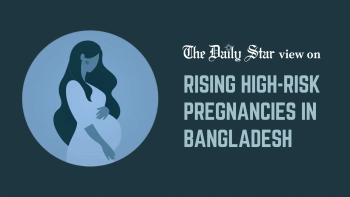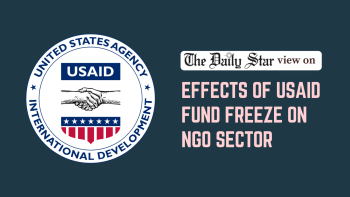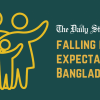Don't let progress in maternal care be reversed by funding cuts

We are concerned about the ongoing and potential funding cuts by our key development partners that could seriously undermine the quality of maternal care in the country. According to a new UN report, reduced funding may weaken the healthcare system by making facilities less effective, reducing the number of healthcare professionals, and disrupting critical supply chains. These setbacks would inevitably compromise both the availability and quality of maternal care. At a time when Bangladesh is striving to lower its maternal mortality rate in line with the relevant SDG target, funding cuts threaten to reverse hard-won gains.
Over the past decades, Bangladesh has made significant strides in reducing maternal and child mortality despite longstanding challenges in the health sector. Much progress has been made in addressing key causes of maternal deaths such as obstetric haemorrhage, hypertensive disorders, unsafe abortions, and other indirect complications. According to the UN, while global maternal deaths fell by 40 percent between 2000 and 2023, Bangladesh achieved an impressive 79 percent reduction—from 523 to 115 deaths per 100,000 live births. This success would not have been possible without improved access to essential healthcare services and the critical support of international donors. With funding now at risk, it will be difficult not only to sustain this progress but also to move forward. Women in remote, rural, and low-income communities stand to suffer the most.
According to the UN, while global maternal deaths fell by 40 percent between 2000 and 2023, Bangladesh achieved an impressive 79 percent reduction—from 523 to 115 deaths per 100,000 live births. This success would not have been possible without improved access to essential healthcare services and the critical support of international donors.
The government, therefore, must act swiftly to mitigate the impact of these funding shortfalls. Developing a self-reliant healthcare model is crucial to safeguarding our achievements in maternal care. Increasing national budget allocations for the health sector—especially for maternal, newborn, and child health projects—must be a top priority. At the same time, collaboration with NGOs is essential to keep key initiatives alive. Securing new investments from alternative sources is equally important.
We must remember that strengthening the healthcare system overall—by ensuring well-equipped facilities, a skilled workforce, and reliable access to life-saving medicines, diagnostic tools, and essential supplies—is central to improving maternal care and preventing deaths. Parallel efforts are also needed to enhance women's economic and educational opportunities, expand access to emergency obstetric care and family planning services, increase skilled birth attendance, and strengthen the network of community health workers. With proper planning and critical reforms, we can ensure that even the most vulnerable women have access to the care they need.


 For all latest news, follow The Daily Star's Google News channel.
For all latest news, follow The Daily Star's Google News channel. 









Comments